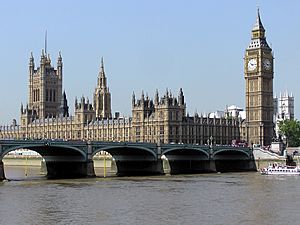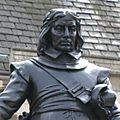Parliament facts for kids
A parliament is a special group of people who make laws for a country. This group is called a legislature.
One of the most famous parliaments is in the United Kingdom. It is sometimes called the "Mother of all Parliaments". The word "parliament" comes from the French word parler, which means "to talk".
The Althing in Iceland is the oldest parliament still existing. It started way back in 930 AD! But it didn't always make laws. Its main job as a law-making body is more recent.
The Parliament of the United Kingdom has three main parts:
- The House of Commons (this is the main part).
- The House of Lords (this is the second part).
- The Monarch (the King or Queen).
Most of the power to make laws is in the House of Commons. It has 650 Members of Parliament (MPs). People in the UK vote for these MPs to represent them. The leader of the political party with the most MPs usually becomes the Prime Minister. The Prime Minister leads the government, but the Monarch is the Head of State.
The House of Commons usually starts new laws, called Bills. They also decide on taxes. The House of Lords can check these Bills and suggest changes. They can even reject Bills, but not Bills about taxes. If the House of Lords rejects a Bill twice or delays it for more than a year, the House of Commons can still make it a law.
The Monarch (like HM Queen Elizabeth II before) is the head of the country. All Bills must get the Monarch's approval, called "Royal Assent," to become laws. The Monarch also officially starts and ends each session of Parliament. This is usually done on the Prime Minister's advice. It's very rare for a Monarch to say no to a Bill today.
Contents
How a Bill Becomes a Law
New laws, called Bills, can start in either the House of Commons or the House of Lords.
1. Checking the Idea (Pre-legislative Scrutiny) Sometimes, a special group of people from both Houses looks at a Bill before it officially starts. They suggest changes. The government can accept or reject these ideas.
2. First Reading
The Bill is officially introduced. No one votes on it yet. It's just printed and announced.
3. Second Reading
Members of Parliament debate the main ideas of the Bill. After the discussion, they vote on whether to continue with the Bill.
4. Committee Stage A smaller group of MPs or Lords looks at each part of the Bill very closely. They can suggest changes, called amendments.
5. Report Stage The whole House gets another chance to look at the Bill and suggest more changes. They discuss and vote on any new amendments.
6. Third Reading
This is the final debate on the Bill as it is now. A final vote is taken. In the House of Lords, they can still make small changes at this point.
7. Moving to the Other House If the Bill passes in one House, it then goes to the other House (e.g., from Commons to Lords, or Lords to Commons).
8. Repeating the Steps The Bill goes through similar steps in the second House:
- First Reading
- Second Reading
- Committee Stage
- Report Stage
- Third Reading
9. Back to the Start If the second House makes changes, the Bill goes back to the first House. They discuss and agree on all the changes.
10. Royal Assent Once both Houses agree on the Bill, it goes to the Monarch for "Royal Assent." When the Monarch approves it, the Bill officially becomes an Act of Parliament, which means it is now a law!
Other Parliaments Around the World
Many other countries have parliaments that work in a similar way to the UK's. They often have:
- A lower house that makes the laws.
- An upper house that reviews the laws and suggests changes.
- A head of state (like a President or Monarch) who has a mostly ceremonial role.
The Prime Minister is almost always the leader of the party with the most seats. If the lower house thinks the Prime Minister is not doing a good job, they can vote to remove them. This is called a vote of no confidence. If this happens, the Prime Minister might have to leave their job or call a new election.
What "Parliament" Means
Sometimes, people use the word "parliament" to describe any group that makes laws, even if it's not exactly like the UK system. But usually, a "parliament" means a legislature that has a Prime Minister as the head of the government.
Parliament vs. Congress
A parliament is a lot like a congress, but there are some differences:
- In a parliament, the members can ask the head of the government (the Prime Minister) to leave their job. In a congress, they usually cannot.
- A congress usually runs for a fixed number of years, as set out in the country's constitution. A parliament can be ended earlier if enough members agree, and then new elections are held.
Countries with Parliaments
Many countries around the world have parliaments, including:
- Australia
- Canada
- Germany
- Greece
- Iceland
- India
- Israel
- Italy
- Malaysia
- Pakistan
- Romania
- Russia
- Ukraine
- United Kingdom
Related Pages
Images for kids
-
The facing benches of the House of Commons of the United Kingdom are said to contribute to an adversarial style of debate.
-
The House of Representatives of Japan
-
The Federal Assembly of Switzerland
-
A 1215 edition of Magna Carta, as featured on display at the British Library
-
The statue of Oliver Cromwell, as it stands outside the House of Commons at the Palace of Westminster
-
Iceland's parliament house, the Alþingishúsið, at Austurvöllur in Reykjavík, built in 1880–1881, home of one of the oldest still-acting parliaments in the world
-
The Art Deco-styled session hall of the Parliament House of Finland
-
The debating chamber of the reconvened Scottish Parliament from the public gallery
-
The Congress of Deputies, the lower house of the Spanish Parliament
-
The centre block of the Parliament of Canada Building in Ottawa
-
The National Diet Building in Tokyo, Japan
See also
 In Spanish: Parlamento para niños
In Spanish: Parlamento para niños






























